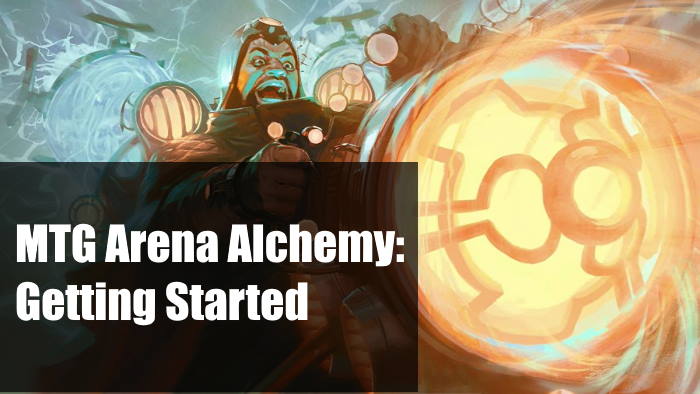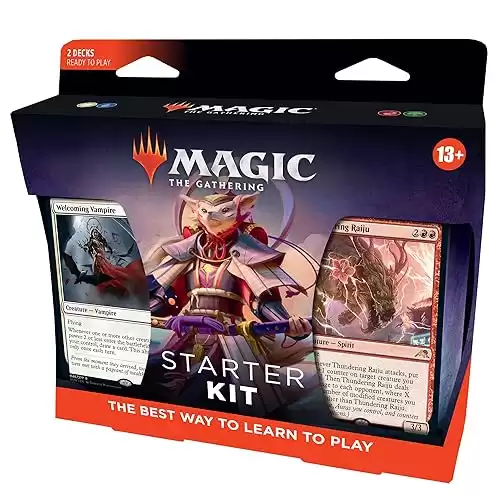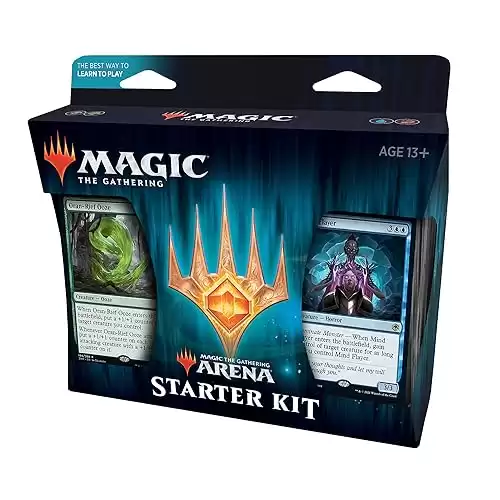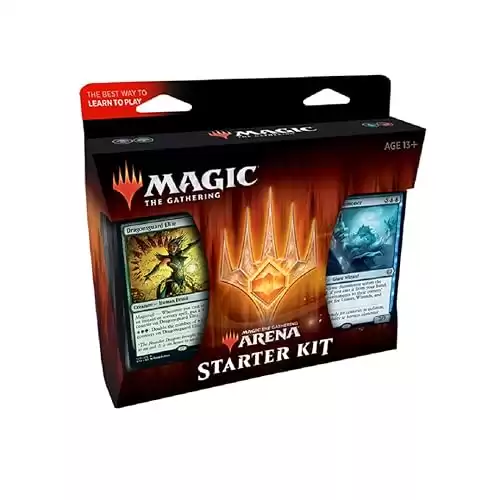Last week, a new MTG Arena format was announced: MTG Alchemy. Alchemy is a format that includes Standard’s card pool, with the addition of rebalanced Standard cards and new digital-only cards found in Alchemy’s inaugural set, Alchemy: Innistrad.
While MTG Alchemy may seem daunting, have no fear! With this handy guide you’ll find the necessary ingredients to make you an Alchemy master in no time.
Table Of Contents:
- What is Alchemy?
- Alchemy Pros and Cons
- What MTG Expansions are in Alchemy?
- When Was Alchemy Released?
- Where Can I Play Alchemy?
- How Much Do Alchemy Packs Cost?
- What Are The New Alchemy Cards?
- What New Mechanics are in Alchemy
- What Cards Were Rebalanced?
- Are Any Cards Banned in Alchemy?
- Are There Any Alchemy Events?
- What is The Current Alchemy Meta?
- What Are Good Alchemy Decks?
- How Do I Build an Alchemy Deck?
- What Are Good Tactics for Alchemy?
- End Step
What is Alchemy?
MTG Alchemy is a digital-only format found exclusively on MTG Arena. Alchemy includes all sets and cards found in Standard, with the addition of digital-only cards and rebalances to certain pre-existing cards.
The format exists as an alternative option to Standard that provides players with balance changes to cards that have become problematic or are in need of an upgrade. With the addition of new digital cards with major set releases, Alchemy stands out as Magic’s premier digital-focused format.
Alchemy Pros and Cons
| Pros | Cons |
| New & Exciting Gameplay | You’ll Need To Use Your Wild Cards |
| Ability To Rebalance Cards At Any Time | Furthers The Divide Between Digital & Paper |
The pros of Alchemy: Alchemy provides exciting gameplay with cards that are exclusive to MTG Arena. In addition, if any cards seem too underpowered or overpowered in Standard, they can receive rebalances in the Alchemy format, making the meta fresh.
The cons of Alchemy: Alchemy is a format that builds off of Arena’s Standard format. As a result you will have to use your wildcards and digital currency effectively to make the most out of your MTG Arena experience.
Consequently Alchemy further divides the line between digital-only players and tabletop players. Going forward, it is unclear if cards banned in Standard will be viable for wildcard refunds for players, since the cards will always be available in Alchemy with rebalanced changes.
What MTG Expansions are in Alchemy?
MTG Alchemy includes all Standard-legal cards currently on MTG Arena, as well as the first Alchemy expansion, Alchemy: Innistrad. It also includes a set of rebalanced cards that already exist in Standard.
Here are the current expansions in Standard:
- Zendikar Rising
- Kaldheim
- Strixhaven
- Dungeons and Dragons: Adventures In The Forgotten Realms
- Innistrad: Midnight Hunt
- Innistrad: Crimson Vow
RELATED: Best Precon Commander Decks
When Was Alchemy Released?
MTG Alchemy released on December 9th, 2021. The format’s release on MTG Arena also included the release of the first Alchemy expansion, Alchemy: Innistrad.
Where Can I Play Alchemy?
MTG Alchemy is only available to play on MTG Arena, Magic’s premier digital client available on Mac, PC, iOS and Android. You can download the desktop here, or the mobile version from the App Store
How Much Do Alchemy Packs Cost?
MTG Alchemy packs cost the exact same amount as any other Standard or Historic booster on MTG Arena. A single pack of Alchemy costs 1,000 Gold. Additionally, you can purchase 15 Alchemy packs for 3,000 Gems.
What Are The New Alchemy Cards?
All of the new MTG Alchemy cards are featured in the first expansion for the format, Alchemy: Innistrad. The set features 60 new digital-only cards.
You can acquire these cards either by opening Alchemy packs or crafting them using wildcards individually. Furthermore, Alchemy: Innistrad features cards that follow the same art and theme as Innistrad Midnight Hunt and Crimson Vow.
Here are some examples of brand new cards found in Alchemy: Innistrad:
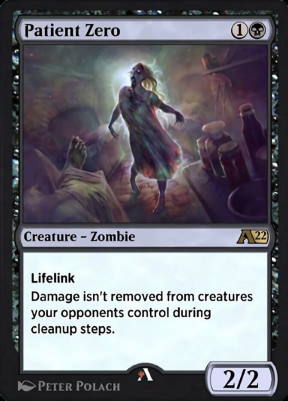
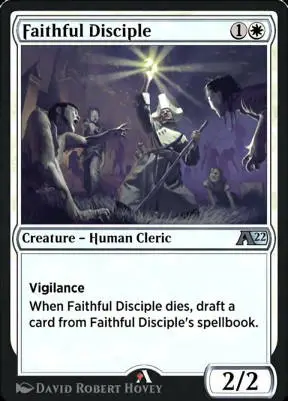
You can find the list of all Alchemy: Innistrad cards at Wizards.
What New Mechanics are in Alchemy?
Before diving into each new card that Alchemy: Innistrad has to offer, it’s first important to know what card mechanics can only be found on digital Magic: the Gathering cards.
Conjure
Conjure is a mechanic that adds cards from outside the game to a player’s hand or deck. Toralf’s Disciple, for example, Conjures four copies of the card Lightning Bolt into your library whenever it attacks.
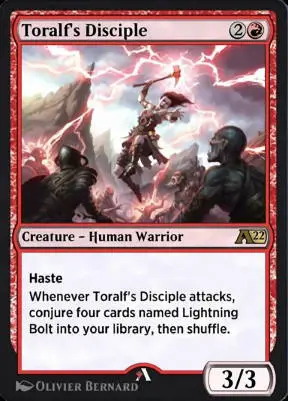
Seek
Seek is a mechanic that randomly adds a card to your hand based on certain requirements. For instance, Kindred Denial Seeks a card from your library that has the same mana value as the spell you countered with it.
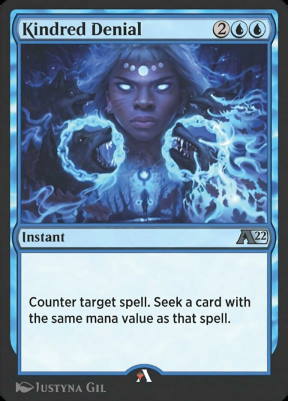
Draft From a Spellbook
Drafting from a spellbook is a mechanic that is a bit tricky to understand. Cards that say “draft from a spellbook” have a set of predetermined cards (usually 15) that can be randomly added to your hand based on that card’s ability.
However, the catch is that when you draft these cards, you’re given three different cards from the spellbook chosen at random to add to your hand. In other words, every time you draft you’ll have a 20% chance of grabbing the specific card you want from that specific card’s spellbook.
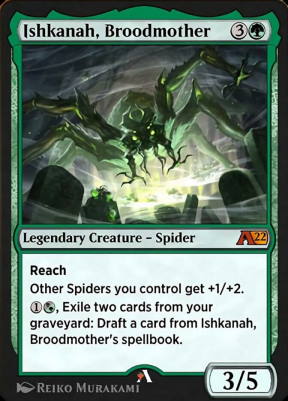
Ishkanah, Broodmother for example includes a spellbook of the following cards, which are all spider-themed:
- Twin-Silk Spider
- Drider
- Brood Weaver
- Glowstone Recluse
- Gnottvold Recluse
- Hatchery Spider
- Mammoth Spider
- Netcaster Spider
- Sentinel Spider
- Snarespinner
- Sporecap Spider
- Spidery Grasp
- Spider Spawning
- Prey Upon
- Arachnoform
Therefore every time you activate Ishkanah, Broodmother’s ability you’ll get the option to pick one of these cards to add to your hand from three random options.
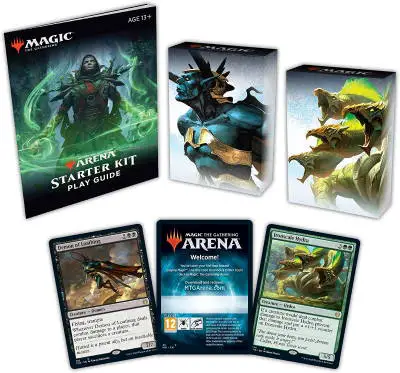
What Cards Were Rebalanced?
In total, 11 cards from Standard have been rebalanced for MTG Alchemy. Let’s take a look at a few of them.
Omnath, Locus of Creation
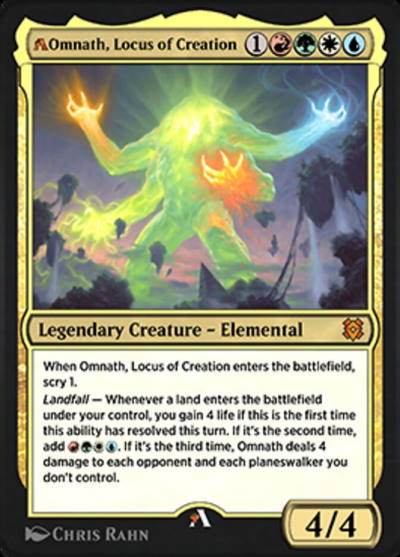
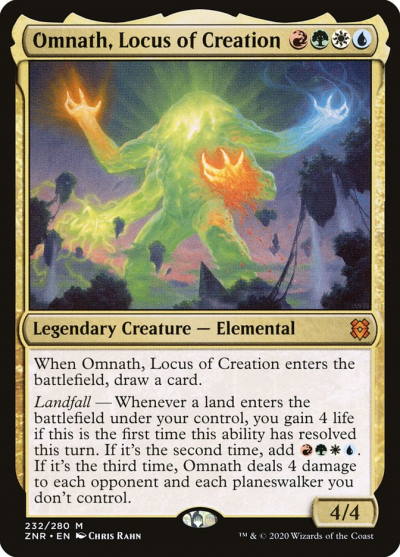
Before the rebalance, Omnath, Locus of Creation was quite an unbalanced card. Upon entering the battlefield it replaced itself by netting you a card. With the printing of Lotus Cobra in Zendikar Rising, it was far too easy to play an Omnath on turn four.
Now, Omnath costs an additional mana to cast and the card draw ability is replaced with scry 1. This is a rebalance that keeps most of the card the same but negates the card replacement effect and forbids you from casting it on turn three.
Alrund’s Epiphany
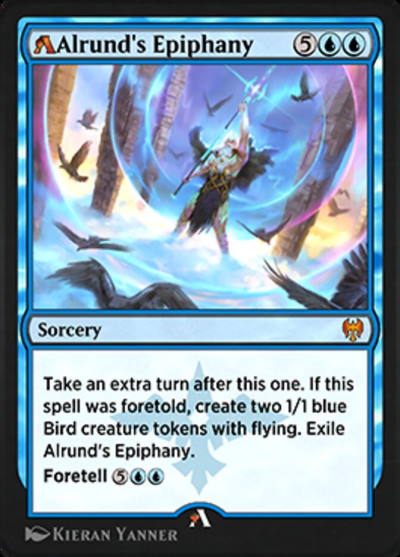
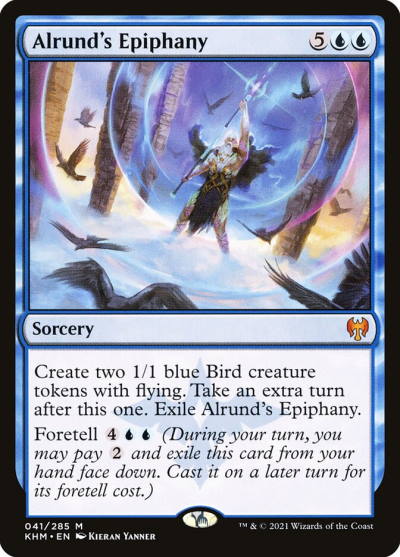
While extra turn cards have existed in Standard in the past, Alrund’s Epiphany is a bit different from previous iterations. Epiphany is exceptionally powerful in the current Standard metagame due to its ability to provide instant pressure in the form of evasive 1/1 flying bird tokens.
Additionally it can be easily copied with cards such as Galvanic Iteration. With the rebalance, you no longer get the bird tokens if it wasn’t foretold, and its foretold cost now no longer reduces the spell’s full casting cost by 1 mana. In other words to get the bird tokens you’ll have to spend a total of 9 mana, making this time walk spell less oppressive than its standard counterpart.
Cosmos Elixir
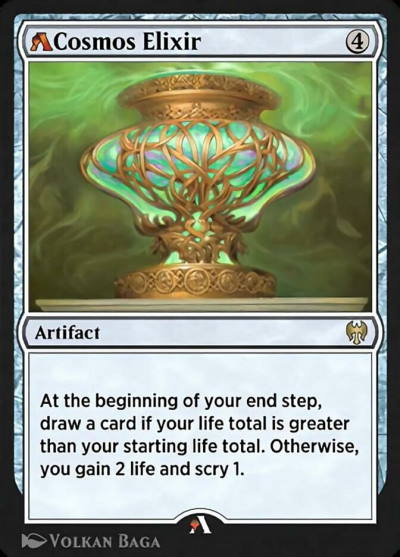
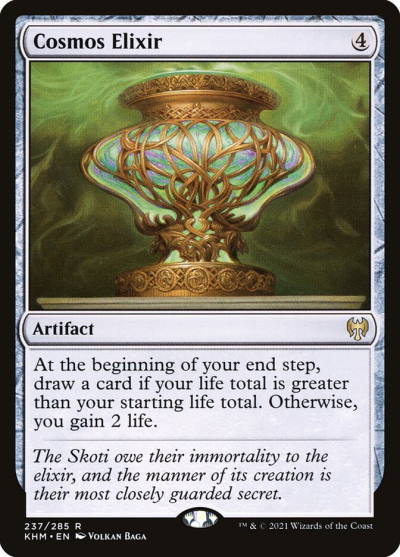
Cosmos Elixir is one of the few cards featured in the rebalance update that actually gets a buff. Now, if you would gain 2 life with Cosmos Elixir’s ability you get to also scry 1. This is a relevant ability that permits you to manipulate your next draw, which can bring you closer to finding a threat or answer for your opponent’s spells.
You can find all the rebalanced cards and notes at Wizards:
RELATED: Best Mana Rocks In MTG
Are Any Cards Banned in Alchemy?
Currently only Grinning Ignus is banned in Alchemy.
You can also tell if a card in Alchemy is rebalanced if it has this symbol located in the upper left-hand corner and bottom of the card:
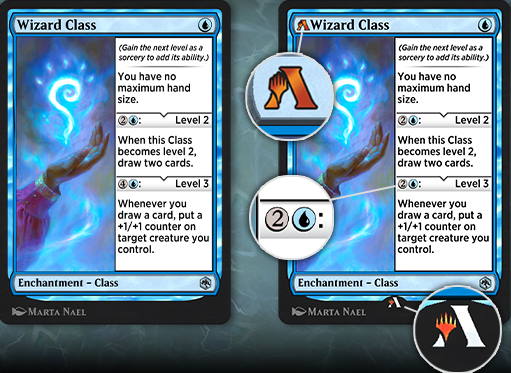
Are There Any Alchemy Events?
There are a few Alchemy events currently featured on MTG Arena. Until December 17th you can play the “Welcome to Alchemy!” event. “Welcome to Alchemy!” is a free event where you build a Best of One Alchemy deck from your collection. Once you obtain 5 wins (losses don’t matter in this event) you will receive 2,000 XP and 3 packs of Alchemy: Innistrad.
Additionally, you can play the Alchemy Event and Traditional Alchemy Event, which have the exact same entry fee and prize payout as the Standard and Historic Events already on MTG Arena. These events do not expire and you can finish them at your leisure.
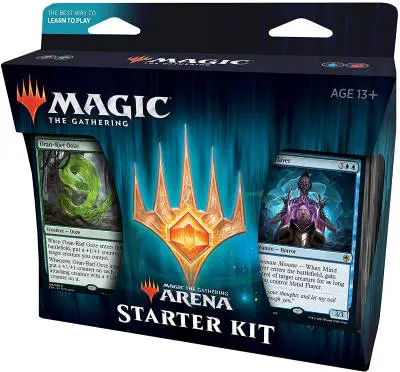
What is The Current Alchemy Meta?
The MTG Alchemy metagame is currently evolving as players test out different color combinations and new and rebalanced cards. This means it is difficult to get a sense right now of the Alchemy metagame as a whole.
However, with an Alchemy Arena Open announced for next year and other tournament organizers picking up on the format, it will be easier to analyze the metagame as a whole. For now, we can take a look at decks popularized by various competitive players and streamers.
What Are Good Alchemy Decks?
While the MTG Alchemy format is brand new, there are already a variety of powerful decks that are popular among competitive Streamers and seasoned players. Currently, there are multiple Aggro, Midrange, Control, and even Combo decks in the format.
Green-Red (Gruul) Aggro Werewolves (via @misterorange)
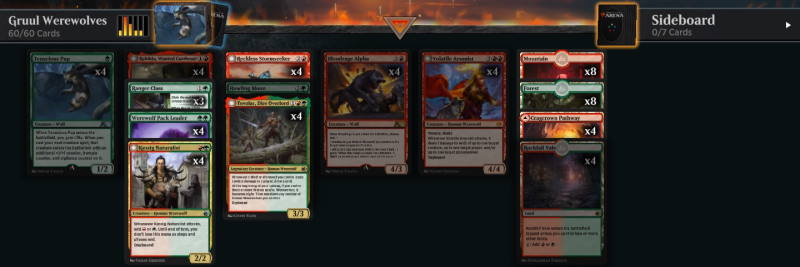
Gruul Werewolves is an aggressive strategy that aims to quickly run over your opponent. Your goal is to land creatures early so that you can draw cards with Tovolar, Dire Overlord.
Tenacious Pup and Rahilda, Wanted Cutthroat are two creatures that help smooth out the curve of the deck as they provide early plays that you wouldn’t have in regular Standard.
| Creatures (35) 4 Tenacious Pup 4 Rahilda, Wanted Cutthroat 3 Ranger Class 4 Werewolf Pack Leader 4 Kessig Naturalist 4 Reckless Stormseeker 4 Tovolar, Dire Overlord 4 Bloodrage Alpha 4 Volatile Arsonist Enchantments (1) 1 Howling Moon | Lands (24) 8 Mountain 8 Forest 4 Cragcrown Pathway 4 Rockfall Vale |
Mono-Black Sacrifice (via @Crokeyz)
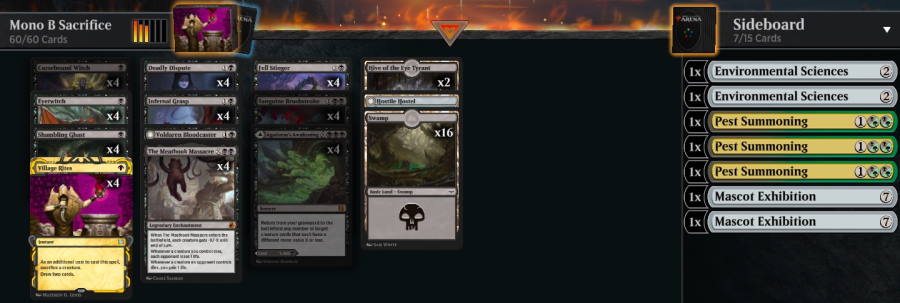
Mono-Black Sacrifice is a deck that aims to out-value the opponent. Utilizing cards such as Sanguine Brushstroke and The Meathook Massacre, the deck kills its opponents with multiple triggers.
Voldaren Bloodcaster allows you to make multiple Blood tokens which combined with Sanguine Brushstroke can kill your opponent very quickly.
| Creatures (17) 4 Eyetwitch 4 Shambling Ghast 4 Fell Stinger 1 Voldaren Bloodcaster 4 Cursebound Witch Spells (24) 4 Village Rites 4 Deadly Dispute 4 Agadeem’s Awakening 4 Infernal Grasp 4 The Meathook Massacre 4 Sanguine Brushstroke | Lands (19) 16 Swamp 2 Hive of the Eye Tyrant 1 Hostile Hostel Sideboard (7) 2 Environmental Sciences 2 Mascot Exhibition 3 Pest Summoning |
Related: Top 10 Best Black Board Wipes
Blue-White (Azorius) Control (via @SethManfield)
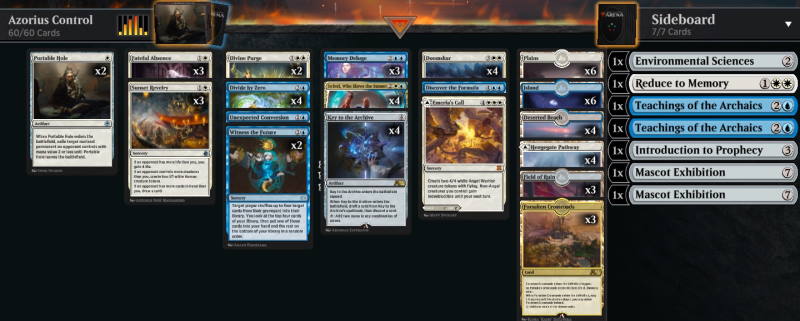
Azorius Control’s goal is to manage the
The key combo in this deck is using Teferi, Who Slows the Sunset to untap Key to the Archive multiple turns in a row, thus giving you lots of mana to draw cards and find your combo pieces with.
| Creatures (4) 4 Teferi, Who Slows the Sunset Spells (26) 2 Portable Hole 3 Fateful Absence 3 Sunset Revelry 2 Divine Purge 4 Divide by Zero 1 Unexpected Conversion 2 Witness the Future 3 Memory Deluge 4 Doomskar 1 Discover the Formula 1 Emeria's Call Artifacts (4) 4 Key to the Archive | Lands (26) 6 Plains 6 Island 4 Deserted Beach 4 Hengegate Pathway 3 Field of Ruin 3 Forsaken Crossroads Sideboard (7) 1 Environmental Sciences 1 Reduce to Memory 2 Teachings of the Archaics 1 Introduction to Prophecy 2 Mascot Exhibition |
Blue-Red (Izzet) Taking Turns (via @AliEldrazi)
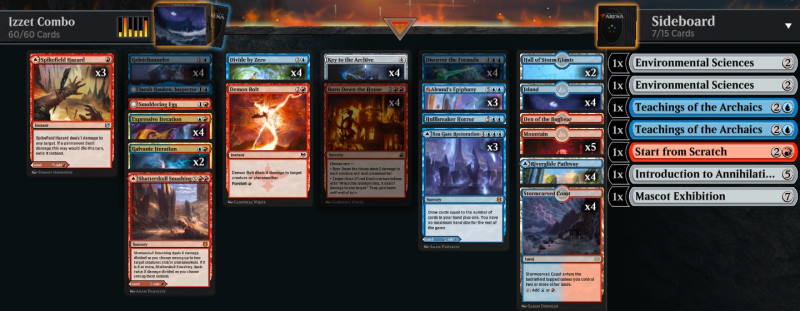
Izzet Combo aims to take multiple turns using Alrund’s Epiphany and Galvanic Iteration. Utilizing new cards such as Geistchanneler, you can cast Alrund’s Epiphany two turns earlier than normal.
You can maintain your opponent’s creatures with cards like Burn Down the House and eventually put yourself into a situation where you can take multiple turns in a row. You can also win games similar to Azorius Control using Key to the Archive to find powerful spells.
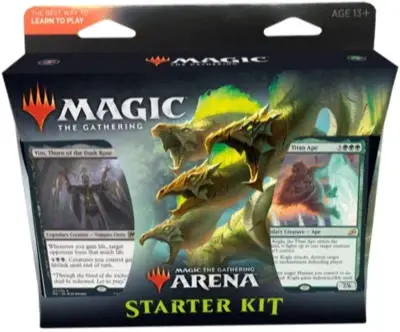
How Do I Build an Alchemy Deck?
When constructing a MTG Alchemy deck there are a variety of different approaches you can take. First of all, since Standard acts as the basis of the Alchemy card pool, it’s worthwhile to know what cards are available in Standard.
The next step is knowing what cards are rebalanced for Alchemy, since they differ from their Standard counterpart. Keep in mind that cards that may be banned in Standard, such as Omanth, Locus of Creation, are legal in Alchemy with a rebalanced version.
Finally, take a look at the digital-only cards in MTG Alchemy and see how they synergize with cards already found in Standard. For example, Alrund’s Epiphany is a card that currently sees play in multiple successful Blue-Red (Izzet) decks in Standard. With MTG Alchemy’s release there are a few cards that synergize with it quite well.
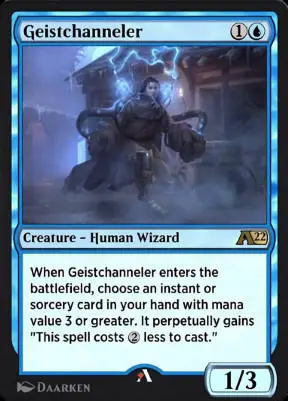
Take Gesitchanneler, for example. With Geistchanneler’s ability you can make an instant or sorcery card in your hand with mana value 3 or greater, such as Alrund’s Epiphany, cost 2 less mana. You can utilize this brand new card to take advantage of a spell that was already known to be quite powerful.
What Are Good Tactics for Alchemy?
Since MTG Alchemy is a digital-only format, you can get an advantage in understanding how each digital-specific keyword works. Let’s take a close look at Key to the Archive for instance:
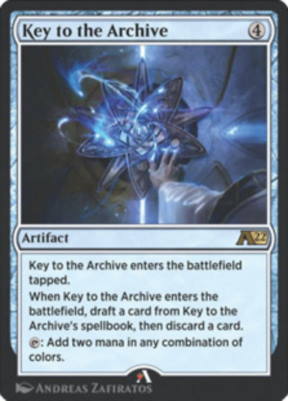
If your opponent resolves Key to the Archive, they’ll get to draft a card specific to Key to the Archive’s spellbook. They’ll get the option to choose one of three cards presented to them each time Key to the Archive enters the battlefield. These are the cards that you can draft from Key to the Archive’s spellbook:
- Approach of the Second Sun
- Day of Judgment
- Time Warp
- Counterspell
- Demonic Tutor
- Doom Blade
- Lightning Bolt
- Claim the Firstborn
- Krosan Grip
- Regrowth
- Despark
- Electrolyze
- Growth Spiral
- Lightning Helix
- Putrefy
Even if you aren’t playing Key to the Archive in your deck it’s important to figure out what cards your opponent might have since drafting the card from Key to the Archive’s spellbook. Your opponent could have access to removal spells such as Putrefy and Lightning Helix or cards that can finish the game such as Approach of the Second Sun.
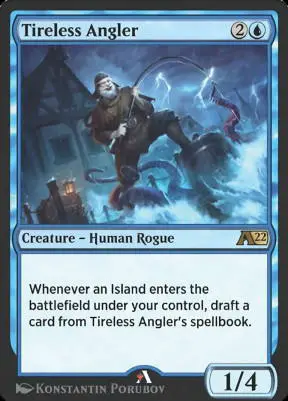
If your opponent casts Approach of the Second Sun, you can use a card such as Field of Ruin to shuffle the Approach of the Second Sun to a random place in your opponent’s library, as opposed to it being seventh from the top.
In conclusion it is vital that you know what cards are found in each Alchemy card’s spellbook so you can anticipate your opponent’s next play.
End Step
MTG Alchemy is an exciting new format to try out on MTG Arena. With the addition of brand new digital-only cards and rebalanced cards, the format is sure to be a home of innovation and interesting deck design.
Unlike other MTG formats, Alchemy is the only format where changes can actively be made to increase or decrease the power level of cards, allowing the format to break free from stagnant gameplay. What are you waiting for? Start brewing today!
